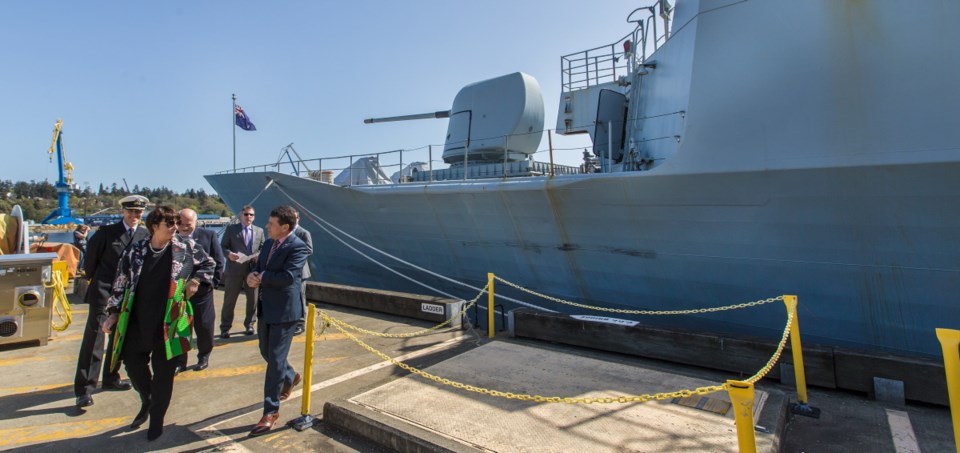New Zealand Navy frigate Te Kaha was officially handed over to Seaspan’s Victoria Shipyards in a ceremony at CFB Esquimalt on Thursday.
On May 1, the 387-foot ship will move from the base to Victoria Shipyards and the federally owned Esquimalt Graving Dock for the start of a combat weapons system modernization.
This is the first time since the Second World War that a foreign warship has been modernized in Canada, said prime contractor Lockheed Martin. Marc Milner, professor of history and director of the Gregg Centre for the Study of War and Society at the University of New Brunswick, said a few foreign warships were repaired during the Second World War, but he knew of no others since then.
The contractors are hoping the project puts Canada on the map internationally, attracting customers for additional high-tech ship systems jobs.
Victoria Shipyards is carrying out the work on the Te Kaha, and on the Te Mana which arrives next year, for Lockheed Martin Canada, which won the $300-million-plus contract in 2014.
Helene Quilter, New Zealand secretary of defence and chief executive of the Ministry of Defence, said at the ceremony that the frigate upgrading program “continues to create opportunities to strengthen the partnership between our two countries, not the least for training and experience sharing.
“It has been no easy process to get to this point,” she said, describing the planning as a detailed and demanding project.
The Te Kaha’s systems are nearing the end of their operational life, she said.
Quilter said that this modernization “takes advantage of new and emerging technologies.”
The significance of this project to New Zealand is “considerable and can not be overstated.”
Lockheed Martin is providing the technology for the work, following up on a similar partnership with Seaspan that saw five Canadian frigates modernized by Victoria Shipyards.
The 20-year-old Te Kaha arrived in Victoria March 6 and has been at Fleet Maintenance Facility Cape Breton, where it has been prepared for the work.
Gary Fudge, acting vice-president and general manager of Lockheed Martin Canada Rotary Mission Systems, said the work on Canada’s Halifax-class frigates allowed the company to turn that experience into an international market opportunity. “We’ve taken some home-grown Canadian technology and we’ve been able to take that and leverage it world-wide and bring good healthy jobs into Canada.”
As the prime systems integrator, Lockheed Martin is responsible for designing and supplying the upgraded combat system for the frigates. This includes a new combat management system, plus the supply and integration of sensors and a missile system.
These systems are expensive and difficult to develop, Fudge said. “Canadian technology is fantastic and it is really scalable and affordable for countries that are in a similar stature to Canada. They don’t have large defence budgets.”
Countries with extensive coastlines need vessels with a lot of capability, he said.
Lockheed Martin has an on-site staff that ranges between 25 and 40 in Victoria. They will oversee shipboard work on the Te Kaha and Te Mana, Fudge said.
Brian Carter, president and chief executive of Seaspan Shipyards, described the work as a rare opportunity, saying the company will continue to work with Lockheed Martin to seek out further projects.
“The Victoria Shipyards team has been very focused on developing our international capability.”
The New Zealand job is “definitely putting us on the map,” he said.
The contracts deliver economic benefits to the capital region.
“It’s going to employ 200 people in our Victoria shipyard for about two years. And also allow us to leverage about 100 companies throughout the region to help us support the refit of these vessels,” Carter said.



